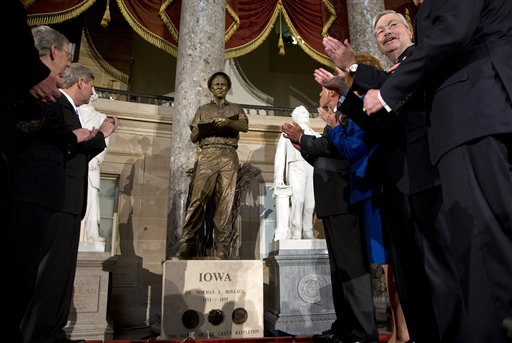 From left, Senate Minority Leader Mitch McConnell of Kentucky; Agriculture Secretary Tom Vilsack; House Speaker John Boehner of Ohio; Jeanie Borlaug Laube, daughter of Dr. Norman E. Borlaug; and Iowa Gov. Terry Branstad applaud after a statue of the late Dr. Norman E. Borlaug is unveiled in Statuary Hall on Capitol Hill in Washington on Tuesday, March 25, 2014.
From left, Senate Minority Leader Mitch McConnell of Kentucky; Agriculture Secretary Tom Vilsack; House Speaker John Boehner of Ohio; Jeanie Borlaug Laube, daughter of Dr. Norman E. Borlaug; and Iowa Gov. Terry Branstad applaud after a statue of the late Dr. Norman E. Borlaug is unveiled in Statuary Hall on Capitol Hill in Washington on Tuesday, March 25, 2014.WASHINGTON - The father of the so-called Green Revolution has a permanent home in the U.S. Capitol.
Lawmakers unveiled a statue of Norman Borlaug on Tuesday in a ceremony on what would have been his 100th birthday. The Iowa native and University of Minnesota graduate is credited with saving as many as 1 billion people from hunger by creating a type of wheat that was disease resistant and high-yielding.
Borlaug, who died in 2009, won the 1970 Nobel Prize for his work and has been awarded the Presidential Medal of Freedom and the Congressional Gold Medal. His likeness will join a group of sculptures that line Statuary Hall in the Capitol, a selection that is limited to only two per state.
"It will be awfully nice to have a miracle worker around here," House Speaker John Boehner joked at Tuesday's ceremony.
Borlaug's statue was created by Benjamin Victor, 35, of South Dakota. His bronze work features Borlaug wearing a hat and a short-sleeved shirt scribbling into a notebook. He has a stoic look on his face and wheat behind him.
To find room for Borlaug, state lawmakers agreed to remove a statue of James Harlan. The statue of the former senator, friend of Abraham Lincoln and interior secretary of President Andrew Johnson had stood in the Capitol for more than 100 years. It will move to the Midwest, finding a home in Mount Pleasant, Iowa, where Harlan used to live.
The speakers at Tuesday's event said Borlaug is a fitting representative of Iowa and its values.
"He combined a brilliant vision and, most importantly, Iowa common sense," said Sen. Charles Grassley, R-Iowa.
Agriculture Secretary Tom Vilsack, a former Iowa governor, said "Norm" was a humble man who wouldn't have accepted the ceremony in his honor without acknowledging the farmers who worked with him and made his vision possible.
"He needed a partner," Vilsack said. "These partners were the farmers."
